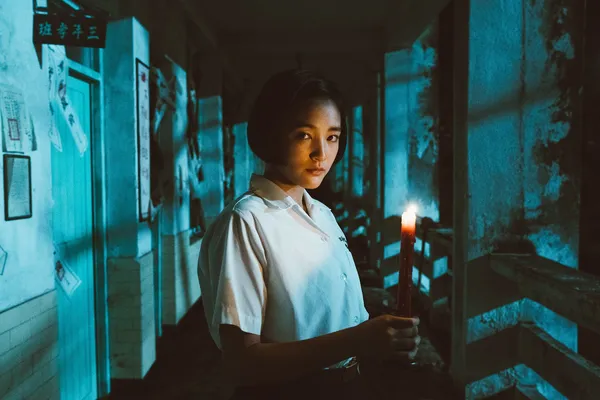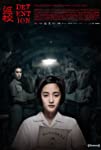Eye For Film >> Movies >> Detention (2019) Film Review
Detention
Reviewed by: Jennie Kermode

On the 28th of February, 1947, a popular uprising took place in Taiwan against the Kuomintang government, followed by the massacre of around 2,000 people thought to have been involved. This was the beginning of a period known as the White Terror, which would go on for 38 years. During this time, intellectuals, prominent social figures and people suspected of harbouring Communist sympathies were routinely arrested, tortured and subjected to summery execution. Estimates of the number of civilians killed run as high as 25,000.
Part of what makes this period so troubling today, especially to those whose loves ones disappeared, is that no-one was ever punished for participating in the terror and there seems to have been a conscious effort to erase historical records. In 2017, the Taipei-based Red Candle Games sought to address this by releasing a video game called Detention, which is set during the period and addresses themes around resistance, culpability and the importance of memory, using horror tropes to invite players to relate to the pressures of the time. John Hsu’s film is a remarkably faithful adaptation of this game, bringing it to a wider audience.
The film is framed around the game’s two player characters, Fang Ray-shin (Wang Gingle) and Wei Chong-ting (Tseng Jing-hua). Wei has a crush on Fang but she seems oblivious to this, with eyes only for one of her teachers, Mr Zhang (Fu Meng-po). Though she idolises her father, his military status keeps him remote from her; he also beats her mother, regarding which she has learned to take his side, damaging that relationship as well. Zhang fills the gap, but though nothing sexual happens between them, it’s clear that an emotional line has been crossed by both, prompting concern in Zhang’s fellow teacher Miss Yin (Cecilia Choi), who, it is implied, may also be his girlfriend. In normal times, this tangled situation would probably lead to broken hearts and stern words from the head teacher. During the White Terror, it’s dangerous on a whole different level.
Zhang, Yin and Wei are all members of a secret book club, studying and discreetly circulating banned texts: the works of Communist thinkers, philosophers and poets. It’s dangerous work but they are desperate to preserve these ideas and keep people open to the fact that there are other ways of thinking and living. The student members of the group tend to romanticise it, creating an ethically troubling situation which mirrors what is happening between Zhang and Fang. Youthful hunger for understanding can easily lead to exploitation and risk, even when the teachers have noble intentions.
There’s the stuff of a really strong drama here, but Tsu has game fans to satisfy, so the bulk of the story is spent inside another character’s nightmare, where we find Fang and Wei trapped inside an abandoned version of the school, hunted by literal monsters which wear the trappings of Kuomintang soldiers. Fang wants to find Mr Zhang. Wei wants to figure out why they’re there. They work together for a short time, following which an unexpected revelation sends them spiralling off on different courses, seeking understanding in their recollections of the past.
Fans of the game have praised the result, but if you’re a newcomer, you may experience some frustration with just how much the structure of a game intrudes into the flow of the film, especially as this is a format in which you cannot directly engage. The acting is good (especially from Wang) and there’s some compellingly subtle exploration of the emotional issues at play, but the story is also very heavy-handed in places and the constant stopping and starting gets wearing.
Cinematographer Li Hsien-chou deserves praise for the immersive way that he has recreated the atmosphere of the game, working with sparsely decorated sets. There’s also some striking use of photo montages displayed on walls, in reference to real world efforts to find or memorialise the disappeared, and this complements a narrative approach which acknowledges that there was no neat division between the innocent and guilty. There’s a suggestion that sometimes the ability to bear witness is more important than moral purity, and a measure of sympathy for those who still carry a burden of shame which might be better placed elsewhere.
Despite the limitations of its approach, Detention is an important piece of work, another step in acknowledging what Taiwan went through and helping it to move forward. It’s also a bold assertion of the right to freedom of expression in a country which remains vulnerable to Chinese expansionist ambition and cultural imperialism. And if you just want to see creepy monsters stalk people around crumbling corridors, you’ll get that too.
Reviewed on: 05 Oct 2021

















